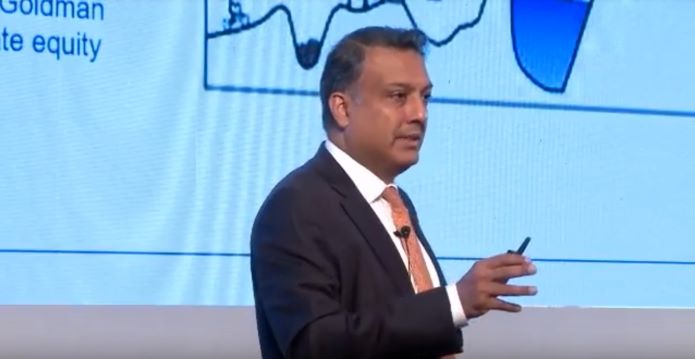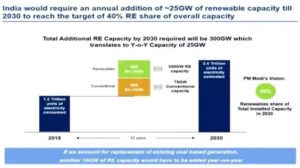Reinvest 2018: ReNew Power Founder Sumant Sinha holds a startup masterclass for Renewables
It fell to Sumant Sinha, chairman and Managing Director of ReNew Power, to showcase his firm's journey from scratch to a billion dollar enterprise, and the huge opportunities the sector offers, for the coming decade and more.
 Sumant Sinha shares the secret sauce at Reinvest 2018
Sumant Sinha shares the secret sauce at Reinvest 2018
Sumant Sinha, chairman and Managing Director of ReNew Power held forth Reinvest Event’s RENNOVATE plenary. As a firm that is barely 8 years old, ReNew Power has been a poster firm for the sector as a whole, thanks to its impressive growth and investor confidence the firm has generated for the sector as a whole. For Sinha, a financial professional who saw the opportunity early and bet everything on it, it has been an amazing ride, and one that had its share of surprises, despite all his efforts.
Sinha started with putting out the numbers that his company ReNew is generating. According to him, ReNew Power is generating 1% of the total electricity generation in India. Ranking 15Th in the list of global renewable companies, it helped mitigate 0.5% of India’s Carbon emissions. Translated for the whole sector, assuming a sectoral contribution of 10% to India’s energy mix, to mitigating 5% of all carbon emissions from India. The firm, from a startup in 2010, has today moved to 96 projects across India, managing over 4000 MW worth of renewable assets. A growth rate that has hit 100% for each of the past 3 years.
Sumant highlighted the employment potential for the sector, with the assertion that directly or indirectly, they realised that they have generated employment for 40,000 people through ReNew projects. Thus, taken for the sector as a whole, potentially 4 million jobs have been created, with potential for much ore as India still has a long way to go on renewables capacity creation.
Building on the renewable opportunity further, Sinha highlighted how at no. 3 in the global pecking order for fresh capacity creation, behind China and the US, the no.2 spot was not too far away for India. A situation that should ideally lead to firms from India gaining global scale and competencies. As the only Indian firm in the global top 15 for the sector, Sinha had high hopes to see more firms from India make it, and do it soon. Highlighting how the renewables sector was necessarily dependent on fund raises, and big fund raises at that, thanks to the higher gestation period and upfront capital costs, he shared his own journey of going through a multitude of VC’s before reaching the same conclusion.
Building on the opportunity using India’s stated goal of 40% renewable contribution to installed capacity by 2030, he highlighted that the number simply means that the country needs to add 25 GW of renewable capacity each year, starting now preferably. Add to that possible closure of older/obsolete thermal plants, and the opportunity could be as large as 35 GW per annum. That simply means that one of the strongest conditions for world class firms, a strong domestic market, is in place, and despite any hiccups, its runway every entrepreneur dreams of. Existing back of the envelope calculations point to a sector that will need $300 billion over the next 12 years. Sharing his own journey, Sinha put down his key learnings for startups in the space, and otherwise too.
- Always have a can-do attitude
- Think about long term building a business
- Build your organisation for people, processes and systems
- Provide confidence to your capital providers
- Really have strong corporate governance, ethics and integrity this eases investors’ fears while funding
- Listen to shareholders treat them like partners

For Sinha, at the end of the day, a solid renewables sector has to help build and have three things going for it. a)Building Grid b)Building Distribution side c)Raising huge amounts of capital. With this he suggested ideas and made special reference to always have strong ethical base.




